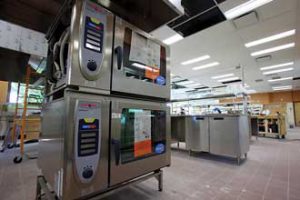
‘Spectacular piece of real estate’ will help train badly needed dietitians of the future
By Jim Hynes
Some visitors to Homecoming on Macdonald Campus last weekend got the first taste of new laboratory facilities that will provide the Faculty of Agricultural and Environmental Sciences’ School of Dietetics and Nutrition and Department of Food Science with a world-class culinary and product development facility for training future dietitians, nutritionists and food scientists.
The new labs replace outdated facilities in basement of the Macdonald-Stewart building.
“Initially we were going to renovate the existing labs, but that became impractical and not logical, because we have chemical labs, microbiological labs and animal facilities, all of which are incompatible with the concept of food safety,” said Dr. Kristine Koski, a professor in and the Director of McGill’s School of Dietetics and Human Nutrition. Her students will be among the principal users of the new facility. “So we had to look for space on campus that could meet our professional training needs.”
That space turned out to be on the second floor of the Centennial Centre.
“It’s a spectacular piece of real estate,” Dr. Koski said.
In the planning stages for a number of years now, actual construction of the new facility, which will cost approximately $4 million once the work is completed, got under way this past May. Approximately half of the funds for building and equipping it were raised through Campaign McGill. Fundraising initiatives for the remainder of the costs are continuing.
The new labs are actually a cluster of four “learning areas” in an open-concept design: a food-preparation lab, a quantity food-preparation lab, a food sensory-testing lab, and a TV camera-ready demonstration classroom where television programs and instructional videos can be produced.
The two food-preparation labs are equipped with the latest in state-of-the-art culinary technology, including high-volume, programmable ovens, a blast-chill refrigerator and walk-in cold rooms and freezers. And just about everything, from the appliances themselves to the ventilation hoods above them, as well as the countertops and other work surfaces, is made of stainless steel. The result is a facility that looks and feels like a small professional cafeteria or commercial or hospital kitchen.
“We train dietitians who will go on to work in hospitals and be involved in food safety. So everything is made of stainless steel to comply with health and safety standards, and like professional kitchens, we’ll have separate counters for handling meats and other foods so there’s no cross-contamination,” Dr. Koski said.
The new food sensory-testing lab now opens up more possibilities for partnering with the food industry, said Dr. Salwa Karboune, a professor from the Department of Food Science and Agricultural Chemistry, who helped design it.
“Companies can test their products, experiment with things like colours, odours, taste and textures, and gauge people’s responses to them,” she said. The lab can accommodate both focus groups and, thanks to individual serving stations, each with its own respondent’s computer screen, up to 14 individual evaluators at a time.
“This type of facility is actually really important because most food companies are using a consumer-driven approach when they want to develop a food product,” Dr. Karboune said. “They bring consumers in, give them the product, and have them evaluate it. And from that they can optimize their formulations.”
About six different courses will use the new facility beginning in the winter 2011 semester. And, Dr. Koski said, the new labs will allow the School of Dietetics and Human Nutrition to double its capacity.
“The original program was designed for 20 students per lab, which meant that we had to limit the size of our program,” Dr. Koski said. “Now we’ll be able to increase our enrolment in first year to a maximum of 200 new students. This is important, because we now recognize that in the province of Quebec alone there will be a need for 1,000 new dietitians every year for the next five years. Currently, the three provincial programs (Laval, Université de Montreal, and McGill) training nutritionists cannot meet this demand. Our facility will help McGill address this provincial shortage by allowing us to train more nutritionists.”

Hello, I am seek a contact person to help to do a visit or tutorial in the milk lab specially in the lactoscan.
I am international development on voluntary basis for a group of women in Tanzania processing milk Africa
My direct line 514-970-4495